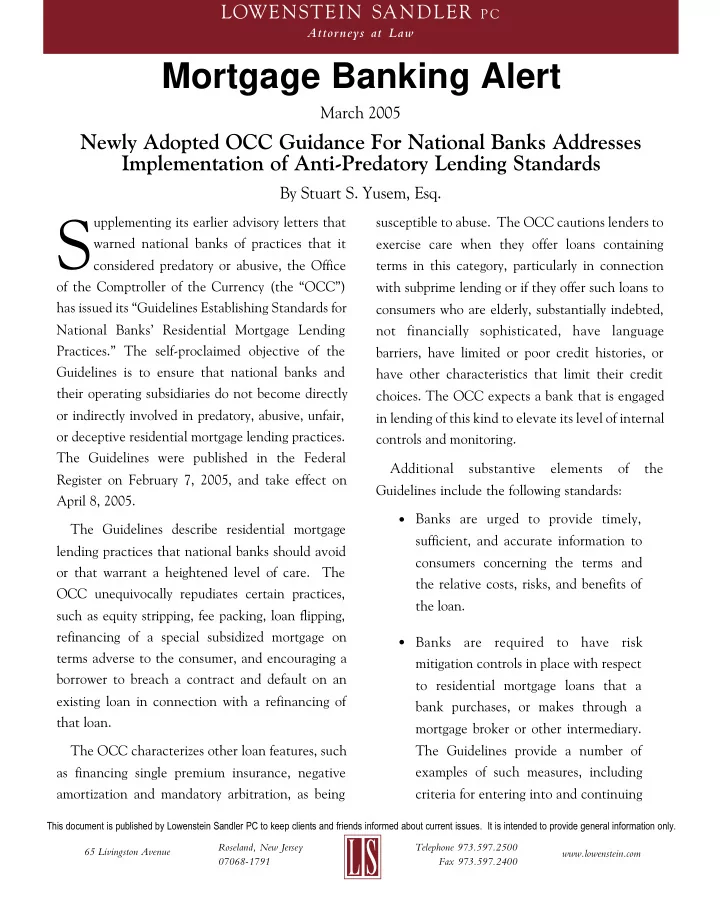

G Mortgage Banking Alert March 2005 Newly Adopted OCC Guidance For National Banks Addresses Implementation of Anti-Predatory Lending Standards By Stuart S. Yusem, Esq. S upplementing its earlier advisory letters that susceptible to abuse. The OCC cautions lenders to warned national banks of practices that it exercise care when they offer loans containing considered predatory or abusive, the Office terms in this category, particularly in connection of the Comptroller of the Currency (the “OCC”) with subprime lending or if they offer such loans to has issued its “Guidelines Establishing Standards for consumers who are elderly, substantially indebted, National Banks’ Residential Mortgage Lending not financially sophisticated, have language Practices.” The self-proclaimed objective of the barriers, have limited or poor credit histories, or Guidelines is to ensure that national banks and have other characteristics that limit their credit their operating subsidiaries do not become directly choices. The OCC expects a bank that is engaged or indirectly involved in predatory, abusive, unfair, in lending of this kind to elevate its level of internal or deceptive residential mortgage lending practices. controls and monitoring. The Guidelines were published in the Federal Additional substantive elements of the Register on February 7, 2005, and take effect on Guidelines include the following standards: April 8, 2005. � Banks are urged to provide timely, The Guidelines describe residential mortgage sufficient, and accurate information to lending practices that national banks should avoid consumers concerning the terms and or that warrant a heightened level of care. The the relative costs, risks, and benefits of OCC unequivocally repudiates certain practices, the loan. such as equity stripping, fee packing, loan flipping, refinancing of a special subsidized mortgage on � Banks are required to have risk terms adverse to the consumer, and encouraging a mitigation controls in place with respect borrower to breach a contract and default on an to residential mortgage loans that a existing loan in connection with a refinancing of bank purchases, or makes through a that loan. mortgage broker or other intermediary. The OCC characterizes other loan features, such The Guidelines provide a number of examples of such measures, including as financing single premium insurance, negative amortization and mandatory arbitration, as being criteria for entering into and continuing This document is published by Lowenstein Sandler PC to keep clients and friends informed about current issues. It is intended to provide general information only. L Roseland, New Jersey Telephone 973.597.2500 65 Livingston Avenue www.lowenstein.com 07068-1791 Fax 973.597.2400
G relationships with intermediaries and letters issued by the OCC in February 2003, originators, methods through which the alerting national banks to practices that the OCC bank may retain appropriate controls considered predatory or abusive. The Guidelines do over mortgage origination functions, not replace the February 2003 advisory letters, but and criteria and procedures for the bank supply “standards” regarding lending practices that to take any necessary corrective action. are, or may in certain contexts be, deemed to be predatory. As phrased by the OCC, the Guidelines � The Guidelines emphasize that a bank’s provide the “core elements” necessary to apply the responsibilities for maintaining controls February 2003 advisory letters in a “framework” are ongoing, for example by evaluating that provides for enforcement on a case-by-case its handling of customer complaints, by basis. taking corrective action in response to its failure to adhere to the requirements A guideline differs from a regulation by giving of the law or its internal lending the regulator more flexibility in interpretation and standards, and for making adjustments enforcement - the violation of a regulation requires to the bank's activities to enhance their the OCC to take specific enforcement action but effectiveness or to reflect changes in for guidelines, the OCC has the discretion to business practices, market conditions, or pursue action appropriate to the circumstances of the bank’s lines of business, loan the offending bank. For example, when dealing programs or customer base. with a guideline, the OCC can take into account the extent of the noncompliance and the bank’s The OCC emphasizes that the Guidelines are self-corrective and remedial responses. Failure of a not intended to be implemented uniformly from bank to take corrective measures could result in an lender to lender. Instead, the OCC says that a order against the bank analogous to a cease-and- bank’s standards for residential mortgage lending desist order. should be appropriate to the bank's size and complexity and the nature and scope of its lending Some consumer advocates have been quick to activities. criticize the Guidelines on the basis that Guidelines are not an effective substitute for strong The Guidelines were adopted pursuant to the enforcement of predatory lending activity, and also OCC’s power to issue either regulations or because practices that the Guidelines deem only guidelines in order to ensure the safety and potentially abusive, such as single premium credit soundness of national banks. The OCC deems fair life insurance, ought to be deemed abusive in all treatment of customers and avoidance of practices circumstances. It is expected the Guidelines will that lead to credit, legal, compliance and not end the call for federal legislative action on the reputation risk to be fundamental to sound banking practices. The Guidelines derive from two advisory subject matter.
G This article is intended to be an introduction to the Guidelines. Any program of compliance will require reference to the complete text of the Guidelines. For more information and counseling as to what appropriate steps your company should take at this time, or for a copy of the any of the laws described here, please contact Stuart S. Yusem at 973.597.2566 or syusem@lowenstein.com.
Recommend
More recommend